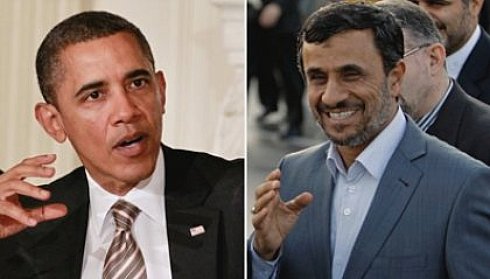Archives
AND MORE...

Ominous City On A Hill
____________________

Build It Or Not, They Will Come
____________________

Please Pretty Please
____________________

Witchcraft, Sorcery & More
____________________
January 18, 2012
Groveling Is Not A Strategy
Any wonder that the guy on the right (see picture below) is laughing at the guy on the left?
Once again the Obama administration is providing Iran much fodder for comic relief. This latest grovel by the Obama administration (see below) comes on the heels of another pathetic request by Obama et al, i.e., that Iran return a U.S. drone that "crashed" there a few months ago.
So what was Iran's response? An Iranian "non-profit" company announced that it would honor President Barack Obama's request that Iran return the drone, but instead of the actual drone, it would send a lot of miniature toy versions. The company is now "trying to determine what Obama's favorite color is" before sending him the mini toys (more on this story here).
If President Obama chooses to make a fool of himself, that's his right. But making the rest of us, indeed the entire United States of America, look like a bunch of jerks is an obamination.
FoxNews.com | January 18, 2012
Iranian Lawmaker Says Obama Proposed Direct Talks In Letter
By Associated Press

The White House had no immediate comment Wednesday on a claim from an Iranian lawmaker that President Obama called for direct talks with Iran in a secret letter to the Islamic Republic's supreme leader that also warned Tehran against closing the strategic Strait of Hormuz.
Iran has threatened to close the waterway, the route for about one-sixth of the global oil flow, because of new U.S. sanctions over its nuclear program.
Conservative lawmaker Ali Motahari revealed the content of the letter days after the Obama administration said it was warning Iran through public and private channels against any action that threatens the flow of oil from the Persian Gulf.
"In the letter, Obama called for direct talks with Iran," the semiofficial Fars news agency quoted Motahari as saying Wednesday. "The letter also said that closing the Strait of Hormuz is (Washington's) red line."
"The first part of the letter contains threats and the second part contains an offer for dialogue," he added.
Iran's Foreign Ministry spokesman Ramin Mehmanparast confirmed that Tehran received the letter and was considering a possible response.
The White House had no comment Wednesday. National Security Council spokesman Tommy Vietor pointed to the administration warning efforts that were revealed Friday.
Spokesmen have been vague on what the United States would do about Iran's threat to block the strategic Strait of Hormuz, but military officials have been clear that the U.S. is readying for a possible naval clash.
Iran's Revolutionary Guard, the country's most powerful military force, says Tehran's leadership has decided to order the closure of the oil route if Iran's oil exports are blocked. A senior Guard officer said earlier this month that the decision has been made by Iran's top authorities.
Iranian politicians have made the threat in the past, but this was the strongest statement yet that a closure of the strait is official policy.
Iran's regular army recently held naval war games near the vital waterway that were described by hard-liners as part of preparations to close the strait if sanctions are imposed. The Guard is planning major naval military exercises next month in the same region.
The U.S. last month enacted new sanctions targeting Iran's central bank and its ability to sell petroleum abroad over Tehran's nuclear program. The U.S. has delayed implementing the sanctions for at least six months, worried about sending the price of oil higher at a time when the global economy is struggling.
Closing the strait would have immense world economic impact. Iran is OPEC's second largest oil producer, and oil exports account for 80 percent of Iran's foreign currency income. To Tehran, an oil embargo would be tantamount to a declaration of war that could provoke the Iranian leadership to block the Hormuz strait.
At issue is Iran's nuclear program. The U.S., Israel and others charge that Iran is trying to build nuclear weapons. Their case was bolstered by a report from the International Atomic Energy late last year, citing evidence that Iran was employing methods and equipment used in making bombs.
Iran has consistently denied that, saying its nuclear program is peaceful, aimed at producing electric power and isotopes for cancer treatment.
Original article here.
Log In »
Notable Quotables
"Mr. Netanyahu is one of the most media-savvy politicians on the planet. On Friday he appeared live via video link on 'Real Time with Bill Maher,' taking the host’s alternately sardonic and serious line of questioning with gazelle-like alacrity."
~ Anthony Grant, jourrnalist who has written for many major newspapers and worked in television at Paris and Tel Aviv, interviewing former PM Benjamin Netanyahu on Monday, at the outset of Mr. Netanyahu's new book (more here).
And Then Some
Dangling Israel
March 24, 2022
New Global Leaders
March 23, 2022
Ukraine Can Learn From Israel
January 31, 2022



